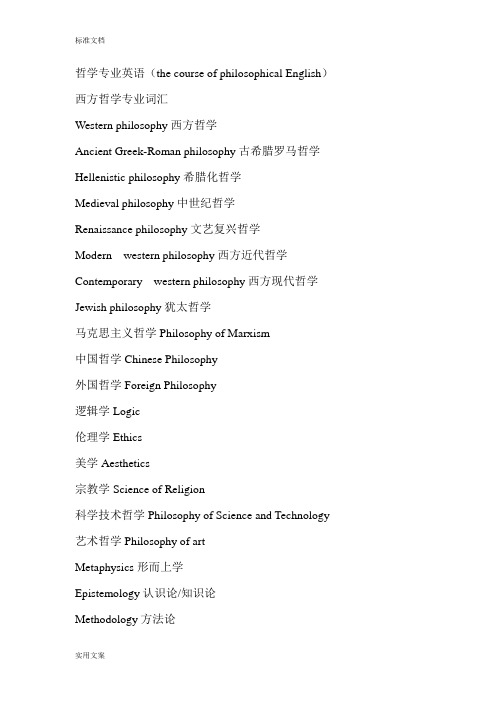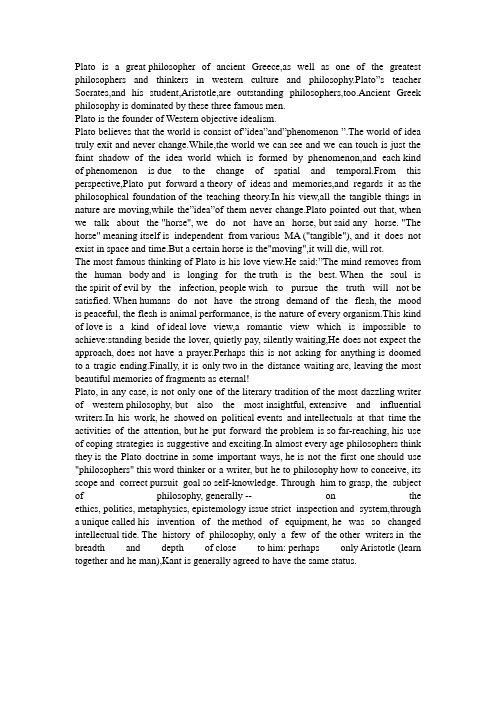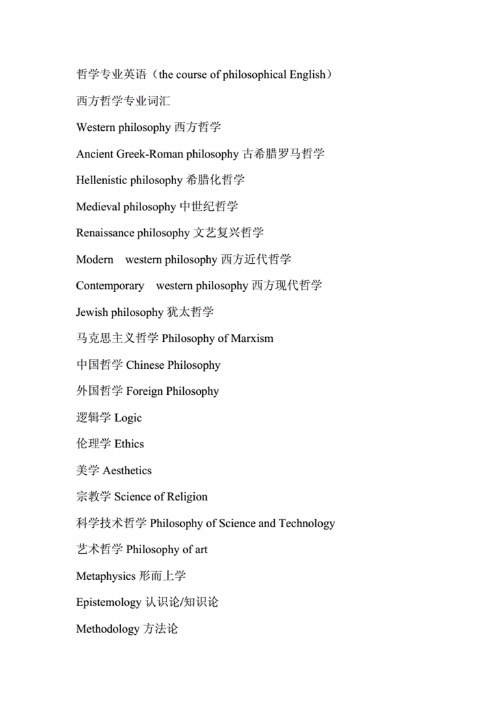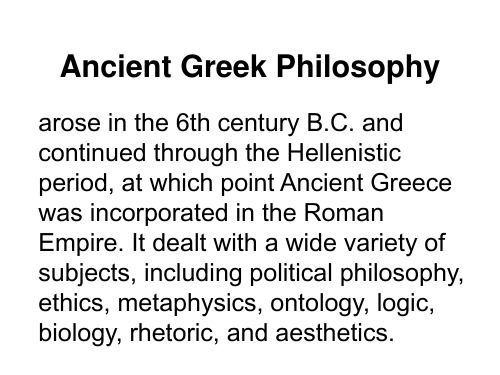Ancient Greek philosophy
哲学专业英语词汇

哲学专业英语(the course of philosophical English)西方哲学专业词汇Western philosophy西方哲学Ancient Greek-Roman philosophy古希腊罗马哲学Hellenistic philosophy希腊化哲学Medieval philosophy中世纪哲学Renaissance philosophy文艺复兴哲学Modern western philosophy西方近代哲学Contemporary western philosophy西方现代哲学Jewish philosophy犹太哲学马克思主义哲学Philosophy of Marxism中国哲学Chinese Philosophy外国哲学Foreign Philosophy逻辑学Logic伦理学Ethics美学Aesthetics宗教学Science of Religion科学技术哲学Philosophy of Science and Technology 艺术哲学Philosophy of artMetaphysics形而上学Epistemology认识论/知识论Methodology方法论ontology本体论Cosmology宇宙论/宇宙生成论Theory of value/axiology价值论Monism一元论Dualism二元论Pluralism多元论Cognosciblism可知论Agnosticism不可知论Materialism唯物主义Irrationalism非理性主义abstract/concrete抽象/具体Idealism唯心主义Objective /Subjective idealism客/主观唯心主义Scepticism怀疑主义Substance实体macrocosm大宇宙microcosm小宇宙Sensibility/understanding/ reason感性/知性/理性Theism有神论Antitheism 无神论Deism自然神论pantheism泛神论Dialectical materialism辩证唯物主义Historical materialism历史唯物主义Law of identity同一律Law of contradiction排中律Law of excluded middle排中律teleology目的论mechanism机械论dialectics辩证法consciousness意识spirit精神belief信念nature自然reality现实,实在possibility可能性Illusion幻想imagination想象力Mysticism神秘主义Spiritualism唯灵论form形式existence存在appearance现象essence本质prime matter原初质料motion运动Continuity/non-Continuity连续性/间断性time and space时间与空间Past-present-future过去/现在/未来cause and effect原因与结果subject and object主体与客体occasionalism偶因论Ockham’s razor奥康剃刀subjectivity主体性Necessity and contingency必然性与偶然性Universals and individuals个别与一般/共相与殊相/普遍与个别relative and absolute相对与绝对intuition直觉idea观念thought思维perception知觉subsistence潜在knowledge知识opinion意见Nature自然Actuality/reality现实Reality实在Necessity and freedom必然与自由Beginning/first principle/arche(希)本原,始基archetype原型illusion幻象image形像,影像ideology意识形态doctrine of correspondence符合说mind-body problem身心问题representative theory of idea表象说finite and infinite有限与无限humanism人道主义,人文主义Natural theology自然神学substratum基质The infinite/boundless/apeiron无定/无限pneuma普纽玛being存在non-being非存在logos逻各斯mind/nous努斯psyche/pneuma普纽玛atom原子void虚空element元素four roots四根self-knowledge自知Becoming/decay生成/衰亡bisection两分法flying arrow is at rest飞矢不动stadium运动场becoming生成doctrine of effluence流射说Eristic/elenchus论辩术,诡辩术art of midwifery/maieutic method助产术/接生术irony讥讽Virtue is knowledge美德即知识world of idea理念世界Infinite regress argument无穷后退证明Simile of the cave洞穴喻Simile of the line线段喻Simile of the sun太阳喻sense world感性世界,感官世界harmony和谐theory of Participation(sharing)分有说theory of Imitation模仿说copy摹本archetype模型,原型paradigm范式model of universal宇宙模型,世界模型soul of universal宇宙灵魂,世界灵魂Philosopher-king哲学王passion激情Wisdom/courage/temperance/justice智慧/勇敢/节制/正义(four cardinal virtue四主德)Desire/passion欲望/激情artificer工匠,创造者Genus种primary/secondary substance第一、二实体form and matter形式与质料accident偶性potentiality and actuality潜能与现实four causes 四因material cause质料因formal cause形式因efficient cause动力因final cause目的因ether以太Actuality现实/entelechy隐德莱希(完全实现)Good/highest good善/至善Category范畴Peripatetics漫步学派active reason/active intellect主动理性/主动理智mean中道,中庸wisdom智慧Practical wisdom实践智慧intellectual virtue理智德性the liar说谎者argument of the measure of grain谷堆论证argument of the baldhead秃头论证argument of the veiled figure隐藏者论证logos of the universe宇宙理性one太一What-it-is 是什么the third man argument第三者论证Theory of recollection回忆说epoche悬搁判断==judgement of suspension ataraxy静观doctrine of emanation流溢说anthropomorphism神人同形同性论=拟人观pythagoreanism毕达哥拉斯主义transmigration of souls灵魂轮回转世说atomism原子论Mode of cyclical reasoning循环论证Good being nature善即自然sensation was due to action between the unlikes异类相知说doctrine of like knows like同类相知说doctrine of seeds种子说Doctrine of love and strife爱恨说doctrine of image影像说cynicism犬儒主义platonism柏拉图主义theory of idea理念论doctrine of the communion of genera通种论aristotelianism亚里士多德主义syllogism三段论Unmoved mover不动的动者==prime moverpurification净化说induction归纳法pyrrhonism皮浪主义Epicureanism伊壁鸠鲁主义canonic准则学Ionian school伊奥尼亚学派Milesian school米利都学派Ephsian school爱菲斯学派Heraclitean school赫拉克利特学派Pythagoreans 毕达哥拉斯学派Eleatic school爱利亚学派privation缺失,匮乏Presocratics前苏格拉底学派Cynics犬儒学派Cyrenaics昔兰尼学派megarian school麦加拉派sophists智者Minor socratics小苏格拉底学派academy学园/柏拉图学园/雅典学园academics学园派peripatetics漫步学派stoics画廊学派/斯多亚学派Epicurean school伊壁鸠鲁学派Christianity基督教Christian philosophy基督教哲学Judaism犹太教Trinity三位一体heresy异端Polytheism多神论eschatology末世论Church fathers教父Providence天意,天命Kingdom of God上帝之国theology神学negative theology否定神学Positive theology肯定神学Patristic philosophy/ Patristics教父哲学/教父学scholasticism经院哲学revealed religion天启宗教,启示宗教Trinity三位一体incarnation道成肉身faith/hope/love信仰/希望/热爱doctrine of redemption救赎论grace神恩,神惠,恩宠omnipotence全能omniscience全知omnipresence全在Argument a posteriori先天证明Argument a priori后天证明fideism信仰主义(僧侣主义)hylozoism物活论Original sin 原罪Justification by faith因信称义Ockham’s razor奥卡姆剃刀nominalism唯名论(extreme/moderate)realism唯实论(extreme/moderate )Augustinism奥古斯丁主义ontological argument本体论证明cosmological argument宇宙论证明teleological argument目的论证明Moral argument道德论证明Supreme good argument至善性证明Faith hope and charity信望爱doctrine of double-truth双重真理论Divine illumination神的光照Theological fatalism神学预定论Thomism托马斯主义Averroism阿威洛伊主义Scotism司各脱主义Rationalism唯理论(materialistic/idealistic )Empiricism经验论(materialistic/idealistic)Social contract theory社会契约论Geographical determinism地理环境决定论Classical German philosophy德国古典哲学Apriorism先天论The reformation宗教改革运动Enlightenment启蒙运动French materialism法国唯物主义Encyclopaedists百科全书派conceptualism概念论Mechanistic materialism机械唯物论learned ignorance有学问的无知maximum极大minimum极小utopia乌托邦universal intellect普遍理智idols假相,偶像theory of four idols四假相说idols of the tribe种族假相idols of the cave洞穴假相idols of the market-place市场假相idols of the theatre剧场假相property and form性质与形式extension广延first principle第一原理Real/nominal essence实在/名义本质blank tablet白板causality因果性causation因果关系cause原因/effect结果experience经验dogma教条Material/Spiritual substance物质/精神实体thinking substance思想实体,思维实体Innate idea天赋观念adventitious ideas外来观念factitious ideas虚幻观念dualism of mind and matter心物二元论Animal sprits精气,元精,动物精神psycho-physical interactionism身心交感论pineal gland松果腺extensive substance广延实体the theory of social contrast社会契约论Association of idea观念的联结(休谟)Cartesianists笛卡儿主义者theory of substance实体论theory of attribute属性论theory of mode样式论(finite/infinite)psycho-physical parallelism心物平行论true idea真观念attribute属性Spinozism斯宾诺莎主义experience经验(external/internal)sensation and reflection感觉与反省abstraction抽象作用abstract idea抽象观念Simple/complex idea简单/复杂观念Immaterialism非物质主义personal identity人格同一性contiguity接近性(休谟)Divine right of kings君权神授说school of continental Rationalism大陆理性派British empirists英国经验派Cambridge platonism 剑桥柏拉图主义Scottish school of common sense苏格兰常识学派Old Hegelians老年黑格尔派Young Hegelians青年黑格尔派Right Hegelians黑格尔右派Left Hegelians黑格尔左派Speculative philosophy 思辨哲学Three tables三表法Table of essence/presence本质表/具有表Table of absence of proximity接近中的缺乏表Table of degree/comparison程度表/比较表Relative/finite substance相对的或有限的实体Absolute/infinite substance绝对的或无限的实体Theory of corpuscles 微粒说Theory of vortex 漩涡说Cartesianism笛卡儿主义cosmotheism宇宙神论(斯宾诺莎)Infinite attribute无限的属性Theory of modes样态论Mode 样态,样式Sensation/reflection感觉/反省External/internal experience外部/内部经验Abstraction抽象作用Psychic force心力(莱布尼兹)Small perception微知觉Principle of continuity连续性原则Idea of substance/modes/relations实体/情状/关系观念real/fantastical ideas实在/幻想观念Intuitive/demonstratic/probable直觉/证明/或然知识primary/secondary/third quality第一/二/三性质real/nominal essence实在/名义本质innate human right天赋人权will of all全体意志monad单子monadology单子论cognition认知Complete notion完满性观念(莱布尼兹)Best of all possible world可能世界中的最佳者sentiment情感——sentimentalismscience of human nature人性科学human nature/humanity人性Per-established harmony前定和谐pre-established harmony预定和谐truth of reason/fact理性真理与事实真理Divine reason 神圣理性theodicy神正论Order of possible coexistence and order of possibilities which cannotcoexist可共存之物的秩序与不可共存之物的秩序existence is to be perceived存在就是被感知immaterialism非物质论idea and notion观念与意念impression and ideas印象与观念resemblance类似关系contiguity in time and space接近关系causal relation因果关系determinism of geographical environment地理环境决定论Theory of the omnipotence of education教育万能论Apodictic/assertoric必然的/实然的(康德)Appearance现象(康德)manifold杂多Physico-theological argument自然神论证明critical philosophy批判哲学dogmatism独断论copernican revolution哥白尼的革命pure reason纯粹理性antinomy二律背反thing-in-itself自在之物,物自体appearance现象practical reason实践理性good will善良意志schein幻相moral law道德律finality apart from an end无目的的合目的性Analytic-synthetic分析-综合Sensibility/understanding/reason感性/知性/理性category范畴command律令reflective judgement反思的判断力representation表象Schema图型/schematism图型论,图式论Metaphysical deduction形而上学演绎Metaphysical exposition形而上学阐明Metaphysics of morals道德性而上学Metaphysics of nature自然形而上学transcendental apperception先验统觉Analogies of experience经验的类推architectonic建筑术Autonomy自主性(康德)transcendental idealism先验唯心主义Kantianism康德主义transcendental先验的transcendent超验的transcendental aesthetic先验感性论transcendental analytic先验分析论Transcendental deduction先验演绎Transcendental dialectic先验辩证论Transcendental illusion先验幻象Transcendental logic先验逻辑Transcendental ideal先验的理想Transcendental paralogism先验谬误推理Transcendental reflection先验反思A priori and synthetic judgement 先天综合判断taste鉴赏力Thing-for-itself为我之物A priori先天A posteriori后天A priori judgement先天判断A posteriori judgement 后天判断analytic judgement分析判断synthetical judgement综合判断Quantity of judgement/ category of Quantity判断的量与量的范畴Qualitaty of judgement/ category of Qualitaty判断的质与质的范畴Relation of judgement/ category of relation判断的关系与关系的范畴Mode of judgement/ category of mode 判断的样式与样式的范畴Anthropology 人本学Absolute religion绝对宗教Free spirit自由精神Objective spirit客观精神practical spirit实践精神theoretical spirit理论精神Subjective spirit主观精神Externalization外化objectification对象化Position肯定Negation否定sublation扬弃identical philosophy同一哲学in itself自我for itself自为absolute idea绝对理念absolute spirit 绝对精神philosophy of mind精神哲学subjective/objective spirit主/客观精神these-antithese-synthese正-反-合civil society市民社会alienation异化dialectic辩证法actuality现实Hegelianism黑格尔主义Young Hegellians 青年黑格尔派Natural theology自然神学(理性神学)absolute ego (费希特的)绝对自我animatism 物活论animism 泛灵论,万物有灵论anthropologism 人本主义the Apostles十二使徒asceticism 禁欲主义atomism 原子论,原子学说atonement 赎罪baptism (基督教)洗礼bourgeoisie 资产阶级causationism 因果论Christianity 基督教clherentism 贯通论The Decalogue摩西十戒deism 理神论;自然神论;自然神论(natural religion)Judgment Day 上帝的最后审判日,世界的末日Kant’s nebular hypothesis 康德的星云假说method of exclusion 排除法method of induction 归纳法nativism 先天论,天赋论sense perception 感性知觉sentience 感觉现象;原始感觉theory of reflection 反映论theory of relativity 相对论theory of representation 表象论On nature《论自然》Purification《净化篇》Sophists《智者篇》Phaedo《斐多篇》Parmenides《巴门尼德篇》Republic《国家篇》On the nature of things《物性论》Meditations《沉思集》Bible《圣经》The Apocalypse/Revelations《圣经》中的《启示录》Genesis (《圣经》)(《创世纪》)New-Testament 《新约全书》Confessions《忏悔录》Utopia《乌托邦》New organon《新工具》Advancement of learning《学术的进展》Human nature《论人性》Leviathan《利维坦》Two treatises of civil government《政府论》An essay concerning human understanding《人类理解论》A treatise concerning the principles of human knowledge《人类知识原理》A treatise of human nature《人性论》An inquiry concerning human understanding 《人类理智研究》Dialogues concerning natural religion《自然宗教对话录》The natural history of religion 《宗教的自然史》Enquiries concerning the principles of morals《道德原理研究》Discourse on method《方法谈》Meditations on first philosophy《第一哲学沉思集》The principles of philosophy《哲学原理》Apology for learned ignorance《论有学问的无知》The principles of Descartes philosophy《笛卡尔哲学原理》Organon《工具论》Enneades《九章集》The ethics《伦理学》New essays on human understanding《人类理智新论》City of god 《上帝之城》Theological-political treatise《神学政治论》Essay on theodicy《神正论》On the improvement of understanding《知性改进论》Critique of pure reason《纯粹理性批判》Critique of practical reason 《实践理性批判》Critique of judgement《判断力批判》。
Ancient Greek philosopher

The Ancient Greek philosophers have played a pivotal role in the shaping of the western philosophical tradition. This article surveys the seminal works and ideas of key figures in the Ancient Greek philosophical tradition from the Presocratics to the Neoplatonists. It highlights their main philosophical concerns and the evolution in their thought from the sixth century BCE to the sixth century CE.The Ancient Greek philosophical tradition broke away from a mythological approach to explaining the world, and it initiated an approach based on reason and evidence. Initially concerned with explaining the entire cosmos, the Presocratic philosophers strived to identify its single underlying principle. Their theories were diverse and none achieved a consensus, yet their legacy was the initiation of the quest to identify underlying principles.This sparked a series of investigations into the limit and role of reason and of our sensory faculties, how knowledge is acquired and what knowledge consists of. Here we find the Greek creation of philosophy as “the love of wisdom,”and the birth of metaphysics, epistemology, and ethics. Socrates, Plato, and Aristotle were the most influential of the ancient Greek philosophers, and they focused their attention more on the role of the human being than on the explanation of the material world. The work of these key philosophers was succeeded by the Stoics and Epicureans who were also concerned with practical aspects of philosophy and the attainment of happiness. Other notable successors are Pyrrho's school of skepticism and the Neoplatonists such as Plotinus who tried to unify Plato's thought with theology.古希腊哲学家在塑造西方哲学传统有举足轻重的作用。
新视野大学英语第三版读写教程第四册课后翻译

第一单元一、英译汉Aristotle was an ancient Greek philosopher and scientist.亚里士多德是古希腊的哲学家和科学家。
His writings cover many subjects, including physics, biology, zoology, logic, ethics, poetry, theater, music, linguistics, politics and government, and constitute the first comprehensive system of Western philosophy.他的作品涵盖了许多学科,包括物理学、生物学、动物学、逻辑学、伦理学、诗歌、戏剧、音乐、语言学、政治和政府,构成了第一个综合的西方哲学体系。
Aristotle was the first to classify areas of human knowledge into distinct disciplines such as mathematics, biology, and ethics.亚里士多德是第一个将人类的知识领域划分为不同学科的人,如数学,生物学和伦理学。
He believed all people's concepts and all their knowledge were ultimately based on perception.他相信人所有的观念和所有的知识在根本上都是基于感知能力。
His views on natural sciences laid the groundwork for many of his works.他对自然科学的看法构成了他许多作品的基础。
He contributed to almost every field of human knowledge in his era.他几乎对他所处时期的每一个人类知识领域都作出了贡献。
英语作文 介绍外国哲学家 柏拉图

Plato is a great philosopher of ancient Greece,as well as one of the greatest philosophers and thinkers in western culture and philosophy.Plato”s teacher Socrates,and his student,Aristotle,are outstanding philosophers,too.Ancient Greek philosophy is dominated by these three famous men.Plato is the founder of Western objective idealism.Plato believes that the world is consist of”idea”and”phenomenon ”.The world of idea truly exit and never change.While,the world we can see and we can touch is just the faint shadow of the idea world which is formed by phenomenon,and each kind of phenomenon is due to the change of spatial and temporal.From this perspective,Plato put forward a theory of ideas and memories,and regards it as the philosophical foundation of the teaching theory.In his view,all the tangible things in nature are moving,while the”idea”of them never change.Plato pointed out that, when we talk about the "horse", we do not have an horse, but said any horse. "The horse" meaning itself is independent from various MA ("tangible"), and it does not exist in space and time.But a certain horse is the"moving",it will die, will rot.The most famous thinking of Plato is his love view.He said:”The mind removes from the human body and is longing for the truth is the best. When the soul is the spirit of evil by the infection, people wish to pursue the truth will not be satisfied. When humans do not have the strong demand of the flesh, the mood is peaceful, the flesh is animal performance, is the nature of every organism.This kind of love is a kind of ideal love view,a romantic view which is impossible to achieve:standing beside the lover, quietly pay, silently waiting,He does not expect the approach, does not have a prayer.Perhaps this is not asking for anything is doomed to a tragic ending.Finally, it is only two in the distance waiting arc, leaving the most beautiful memories of fragments as eternal!Plato, in any case, is not only one of the literary tradition of the most dazzling writer of western philosophy, but also the most insightful, extensive and influential writers.In his work, he showed on political events and intellectuals at that time the activities of the attention, but he put forward the problem is so far-reaching, his use of coping strategies is suggestive and exciting.In almost every age philosophers think they is the Plato doctrine in some important ways, he is not the first one should use "philosophers" this word thinker or a writer, but he to philosophy how to conceive, its scope and correct pursuit goal so self-knowledge. Through him to grasp, the subject of philosophy, generally -- on the ethics, politics, metaphysics, epistemology issue strict inspection and system,through a unique called his invention of the method of equipment, he was so changed intellectual tide. The history of philosophy, only a few of the other writers in the breadth and depth of close to him: perhaps only Aristotle (learn together and he man),Kant is generally agreed to have the same status.。
哲学专业英语词汇【参考】

哲学专业英语(the course of philosophical English)西方哲学专业词汇Western philosophy西方哲学Ancient Greek-Roman philosophy古希腊罗马哲学Hellenistic philosophy希腊化哲学Medieval philosophy世纪哲学Renaissance philosophy文艺复兴哲学Modem western philosophy西方近代哲学Contemporary western philosophy西方现代哲学Jewish philosophy犹太哲学马克思主义哲学Philosophy of Marxism中国哲学Chinese Philosophy外国哲学Foreign Philosophy逻辑学Logic伦理学Ethics美学Aesthetics宗教学Science of Religion科学技术哲学Philosophy of Science and Technology 艺术哲学Philosophy of artMetaphysics形而上学Epistemology认识论/知识论Methodology方法论ontology本体论Cosmology宇宙论/宇宙生成论Theory of value/axiology价值论Monism一元论Dualism二元论Pluralism多元论Cognosciblism可知论Agnosticism不可知论Materialism唯物主义Irrationalism非理性主义abstract/concrete抽象/具体Idealism唯心主义Objective/Subjective idealism客/主观唯心主义Scepticism怀疑主义Substance实体macrocosm大宇宙microcosm小宇宙Sensibility/understanding/reason感性/知性/理性Theism有神论Antitheism无神论Deism自然神论pantheism泛神论Dialectical materialism辩证唯物主义Historical materialism历史唯物主义Law of identity同一律Law of contradiction排中律Law of excluded middle排中律teleology目的论mechanism机械论dialectics辩证法consciousness意识spirit精神belief信念nature自然reality现实,实在possibility可能性Illusion幻想imagination想象力Mysticism神秘主义Spiritualism唯灵论form形式existence存在appearance现象essence本质prime matter原初质料motion运动Continuity/non-Continuity连续性/间断性time and space时间与空间Past-present-future过去/现在/未来cause and effect原因与结果subject and object主体与客体occasionalism偶因论Ockham's razoi•奥康剃刀subjectivity主体性Necessity and contingency必然性与偶然性Universals and individuals个别与一般/共相与殊相/普遍与个别relative and absolute相对与绝对intuition直觉idea观念thought思维perception知觉subsistence潜在knowledge知识opinion意见Nature自然Actuality/reality现实Reality实在Necessity and freedom必然与自由Beginning/first principle/arche(希)本原,始基archetype原型illusion幻象image形像,影像ideology意识形态doctrine of correspondence符合说mind-body problem身心问题representative theory of idea表象说finite and infinite有限与无限humanism人道主义,人文主义Natural theology自然神学substratum基质The infinite/boundless/apeiron无定/无限pneuma普纽玛being存在non-being非存在logos逻各斯mind/nous努斯psyche/pneuma普纽玛atom原子void虚空element元素four roots四根self-knowledge自知Becoming/decay生成/衰亡bisection两分法flying arrow is at rest飞矢不动stadium运动场becoming生成doctrine of effluence流射说Eristic/elenchus论辩术,诡辩术art of midwifery/maieutic method助产术/接生术irony讥讽Virtue is knowledge美德即知识world of idea理念世界Infinite regress argument无穷后退证明Simile of the cave洞穴喻Simile of the line线段喻Simile of the sun太阳喻sense world感性世界,感官世界harmony和谐theory of Participation(sharing)分有说theory of Imitation模仿说copy摹本archetype模型,原型paradigm范式model of universal宇宙模型,世界模型soul of universal宇宙灵魂,世界灵魂Philosopher-king哲学王passion激情Wisdom/courage/temperance>5ustice智慧/勇敢/节制/正义(four cardinal virtue四主德)Desire/passion欲望/激情artificer工匠,创造者Genus种primary/secondary substance第一、二实体form and matter形式与质料accident偶性potentiality and actuality潜能与现实four causes四因material cause质料因formal cause形式因efficient cause动力因final cause目的因ether以太Actuality现实/entelechy隐德莱希(完全实现)Good/highest good善/至善Category范畴Peripatetics漫步学派active reason/active intellect主动理性/主动理智mean中道,中庸wisdom智慧Practical wisdom实践智慧intellectual virtue理智德性the liar说谎者argument of the measure of grain谷堆论证argument of the baldhead秃头论证argument of the veiled figure隐藏者论证logos of the universe宇宙理性one太一What-it-is是什么the third man argument第三者论证Theory of recollection回忆说epoche悬搁判断=judgement of suspension ataraxy静观doctrine of emanation流溢说anthropomorphism神人同形同性论=拟人观pythagoreanism毕达哥拉斯主义transmigration of souls灵魂轮回转世说atomism原子论Mode of cyclical reasoning循环论证Good being nature善即自然sensation was due to action between the unlikes异类相知说doctrine of like knows like同类相知说doctrine of seeds种子说Doctrine of love and strife爱恨说doctrine of image影像说cynicism犬儒主义platonism柏拉图主义theory of idea理念论doctrine of the communion of genera通种论aristotelianism亚里士多德主义syllogism三段论Unmoved mover不动的动者==prime moverpurification净化说induction归纳法Pyrrhonism皮浪主义Epicureanism伊壁鸠鲁主义canonic准则学Ionian school伊奥尼亚学派Milesian school米利都学派印hsian school爱菲斯学派Heraclitean school赫拉克利特学派Pythagoreans毕达哥拉斯学派Eleatic school爱利亚学派privation缺失,匮乏Presocratics前苏格拉底学派Cynics犬儒学派Cyrenaics昔兰尼学派megarian school麦加拉派sophists智者Minor socratics小苏格拉底学派academy学园/柏拉图学园/雅典学园academics学园派peripatetics漫步学派stoics画廊学派/斯多亚学派Epicurean school伊壁鸠鲁学派Christianity基督教Christian philosophy基督教哲学Judaism犹太教Trinity三位一体heresy异端Polytheism多神论eschatology末世论Church fathers教父Providence天意,天命Kingdom of God上帝之国theology神学negative theology否定神学Positive theology肯定神学Patristic philosophy/Patristics教父哲学/教父学scholasticism经院哲学revealed religion天启宗教,启示宗教Trinity三位一体incarnation道成肉身faith/hope/love信仰/希望/热爱doctrine of redemption救赎论grace神恩,神惠,恩宠omnipotence全能omniscience全知omnipresence全在Argument a posteriori先天证明Argument a priori后天证明fldeism信仰主义(僧侣主义)hylozoism物活论Original sin原罪Justification by faith因信称义Ockham's razor奥卡姆剃刀nominalism唯名论(extreme/moderate) realism唯实论(extreme/moderate) Augustinism奥古斯丁主义ontological argument本体论证明cosmological argument宇宙论证明teleological argument目的论证明Moral argument道德论证明Supreme good argument至善性证明Faith hope and charity信望爱doctrine of double-truth双重真理论Divine illumination神的光照Theological fatalism神学预定论Thomism托马斯主义Averroism阿威洛伊主义Scotism司各脱主义Rationalism唯理论(materialistic/idealistic)Empiricism经验论(materialistic/idealistic) Social contract theory社会契约论Geographical determinism地理环境决定论Classical German philosophy德国古典哲学Aphorism先天论The reformation宗教改革运动Enlightenment启蒙运动French materialism法国唯物主义Encyclopaedists百科全书派conceptualism概念论Mechanistic materialism机械唯物论learned ignorance有学问的无知maximum极大minimum极小utopia乌托邦universal intellect普遍理智idols假相,偶像theory of four idols四假相说idols of the tribe种族假相idols of the cave洞穴假相idols of the market-place市场假相idols of the theatre剧场假相property and form性质与形式extension广延first principle第一原理Real/nominal essence实在/名义本质blank tablet白板causality因果性causation因果关系cause原因/effect结果experience经验dogma教条Material/Spiritual substance物质/精神实体thinking substance思想实体,思维实体Innate idea天赋观念adventitious ideas外来观念factitious ideas虚幻观念dualism of mind and matter物二元论Animal sprits精气,元精,动物精神psycho-physical interactionism身,C?交感论pineal gland松果腺extensive substance广延实体the theory of social contrast社会契约论Association of idea观念的联结(休谟)Cartesianists笛卡儿主义者theory of substance实体论theory of attribute属性论theory of mode样式论(finite/infinite)psycho-physical parallelism心物平行论true idea真观念attribute属性Spinozism斯宾诺莎主义experience经验(extemal/intemal)sensation and reflection感觉与反省abstraction抽象作用abstract idea抽象观念Simple/complex idea简单/复杂观念Immaterialism非物质主义personal identity人格同一性contiguity接近性(休谟)Divine right of kings君权神授说school of continental Rationalism大陆理性派British empirists英国经验派Cambridge platonism剑桥柏拉图主义Scottish school of common sense苏格兰常识学派Old Hegelians老年黑格尔派Young Hegelians青年黑格尔派Right Hegelians黑格尔右派Left Hegelians黑格尔左派Speculative philosophy思辨哲学Three tables三表法Table of essence/presence本质表/具有表Table of absence of proximity接近中的缺乏表Table of degree/comparison程度表/比较表Relative/finite substance相对的或有限的实体Absolute/infinite substance绝对的或无限的实体Theory of corpuscles微粒说Theory of vortex漩涡说Cartesianism笛卡儿主义cosmotheism宇宙神论(斯宾诺莎)Infinite attribute无限的属性Theory of modes样态论Mode样态,样式Sensation/reflection感觉/反省Extemal/intemal experience外部/内部经验Abstraction抽象作用Psychic force心力(莱布尼兹)Small perception微知觉Principle of continuity连续性原则Idea of substance/modes/relations实体/情状/关系观念real/fantastical ideas实在/幻想观念Intuitive/demonstratic/probable直觉/证明/或然知识primary/secondary/third quality第一/二/三性质real/nominal essence实在/名义本质innate human right天赋人权will of all全体意志monad单子monadology单子论cognition认矢口Complete notion完满性观念(莱布尼兹)Best of all possible world可能世界中的最佳者sentiment'I■青感---entimentalismscience of human nature人性科学human nature/humanity人性Per-established harmony前定和谐pre-established harmony预定和谐truth ofreason/fact理性真理与事实真理Divine reason神圣理性theodicy神正论Order of possible coexistence and order of possibilities which cannotcoexist可共存之物的秩序与不可共存之物的秩序existence is to be perceived存在就是被感知immaterialism非物质论idea and notion观念与意念impression and ideas印象与观念resemblance类似关系contiguity in time and space接近关系causal relation因果关系determinism of geographical environment地理环境决定论Theory of the omnipotence of education教育万能论Apodictic/assertoric必然的/实然的(康德)Appearance现象(康德)manifold杂多Physico-theological argument自然神论证明critical philosophy批判哲学dogmatism独断论copemican revolution哥白尼的革命pure reason纯粹理性antinomy二律背反thing-in-itself自在之物,物自体appearance现象practical reason实践理性good will善良意志schein幻相moral law道德律finality apart from an end无目的的合目的性Analytic-synthetic分析■综合Sensibility/understanding/reason感性/知性/理性category范畴command律令reflective judgement反思的判断力representation表象Schema图型/schematism图型论,图式论Metaphysical deduction形而上学演绎Metaphysical exposition形而上学阐明Metaphysics of morals道德性而上学Metaphysics of nature自然形而上学transcendental apperception先验统觉Analogies of experience经验的类推architectonic建筑术Autonomy自主性(康德)transcendental idealism先验唯心主义Kantianism康德主义transcendental先验的transcendent超验的transcendental aesthetic先验感性论transcendental analytic先验分析论Transcendental deduction先验演绎Transcendental dialectic先验辩证论Transcendental illusion先验幻象Transcendental logic先验逻辑Transcendental ideal先验的理想Transcendental paralogism先验谬误推理Transcendental reflection先验反思A priori and synthetic judgement先天综合判断taste鉴赏力Thing-fbr-itself为我之物A priori先天A posteriori后天A priori j u dgement先天判断A posteriori judgement后天判断analytic judgement分析判断synthetical judgement综合判断Quantity of j udgement/category of Quantity判断的量与量的范畴Qualitaty of j udgement/category of Qualitaty判断的质与质的范畴Relation of j udgement/category of relation判断的关系与关系的范畴Mode of j udgement/category of mode判断的样式与样式的范畴Anthropology人本学Absolute religion绝对宗教Free spirit自由精神Objective spirit客观精神practical spirit实践精神theoretical spirit理论精神Subjective spirit主观精神Extemalization外化objectification对象化Position肯定Negation否定sublation扬弃identical philosophy同一哲学in itself自我for itself自为absolute idea绝对理念absolute spirit绝对精神philosophy of mind精神哲学subjective/objective spirit主/客观精神these-antithese-synthese正■反■合civil society市民社会alienation异化dialectic辩证法actuality现实Hegelianism黑格尔主义Young Hegellians青年黑格尔派Natural theology fl然神学(理性神学)absolute ego(费希特的)绝对自我animatism物活论animism泛灵论,万物有灵论anthropologism人本主义the Apostles十二使徒asceticism禁欲主义atomism原子论,原子学说atonement赎罪baptism(基督教)洗礼bourgeoisie资产阶级causationism因果论Christianity基督教clherentism贯通论The Decalogue摩西十戒deism理神论;自然神论:自然神论(natural religion)Judgment Day±帝的最后审判日,世界的末日Kant's nebular hypothesis康德的星云假说method of exclusion排除法method of induction归纳法nativism先天论,天赋论sense perception感性知觉sentience感觉现象;原始感觉theory of reflection反映论theory of relativity相对论theory of representation表象论On nature《论自然》Purification《净化篇》Sophists《智者篇》Phaedo《斐多篇》Parmenides《巴门尼德篇》Republic《国家篇》On the nature of things《物性论》Meditations《沉思集》Bible《圣经》The Apocalypse/Revelations《圣经》中的《启示录》Genesis(《圣经》)(《创世纪》)New-Testament《新约全书》Confessions《忏悔录》Utopia《乌托邦》New organon《新工具》Advancement of learning《学术的进展》Human nature《论人性》Leviathan《利维坦》Two treatises of civil government《政府论》An essay concerning human understanding《人类理解论》A treatise concerning the principles of human knowledge《人类知识原理》A treatise of human nature《人性论》An inquiry concerning human understanding《人类理智研究》Dialogues concerning natural religion《自然宗教对话录》The natural history of religion《宗教的自然史》Enquiries concerning the principles of morals《道德原理研究》Discourse on method《方法谈》Meditations on first philosophy《第一哲学沉思集》The principles of philosophy《哲学原理》Apology for learned ignorance《论有学问的无知》The principles of Descartes philosophy《笛卡尔哲学原理》Organon《匚具论》Enneades《九章集》The ethics《伦理学》New essays on human understanding《人类理智新论》City of god《上帝之城》Theological-political treatise《神学政治论》Essay on theodicy《神正论》On the improvement of understanding《知性改进论》Critique of pure reason《纯粹理性批判》Critique of practical reason《实践理性批判》Critique of j udgement《判断力批判》。
初三英语哲学思考问题分析单选题40题

初三英语哲学思考问题分析单选题40题1. In the philosophy of Plato, the Forms are considered as:A. Tangible objectsB. Abstract ideasC. Sensory experiencesD. Physical events答案:B。
本题主要考查柏拉图哲学中“形式”的概念。
选项A 有形物体不符合柏拉图对形式的定义;选项C 感官体验并非柏拉图所强调的形式;选项D 物理事件也不是柏拉图所指的形式。
柏拉图认为形式是抽象的理念,故选B。
2. Aristotle's view on the nature of reality emphasizes:A. The separation of mind and bodyB. The importance of final causesC. The randomness of eventsD. The insignificance of purpose答案:B。
在亚里士多德的现实本质观中,选项A 身心分离并非其重点;选项 C 事件的随机性不符合他的观点;选项 D 目的的无意义也不是他的主张。
亚里士多德强调最终因的重要性,故选B。
3. The concept of "tabula rasa" is associated with:A. DescartesB. LockeC. Kant答案:B。
“白板说”这一概念与洛克相关。
选项 A 笛卡尔、选项C 康德、选项D 休谟均与此概念无关,故选B。
4. In Stoicism, the key to a virtuous life lies in:A. Pursuing pleasureB. Controlling emotionsC. Acquiring wealthD. Seeking fame答案:B。
在斯多葛学派中,过上有德行生活的关键在于控制情绪。
ancientgreekphilosopheraristotleviewedlaughteras“

Ancient Greek philosopher Aristotle viewed laughter as ―a bodily exercise precious to health.‖ But despite some claims to the contrary, chuckling probably has little influence on physical fitness. Laughter does produce short-term changes in cardiovascular function and respiration, boosting heart rate, respiratory rate and depth, as well as oxygen consumption.But because hard laughter is difficult to sustain, a good guffaw is unlikely to have measurable cardiovascular benefits the way, say, walking or jogging does.In fact, instead of straining muscles to build them, as exercise does, laughter apparently accomplishes the opposite. Studies dating back to the 1930s indicate that laughter relaxes muscles, decreasing muscle tone for up to 45 minutes after the guffaw subsides.Such physical relaxation might conceivably help moderate the effects of psychological stress. After all, the act of laughing probably does produce other types of physical feedback that improve an individual’s emotional state. According to one classical theory of emotion, our feelings are partially rooted in physical reactions. American psychologist William James and Danish physiologist Carl Lange argued at the end of the 19th century that humans do not cry because they are sad but that they become sad when the tears begin to flow.Although sadness also precedes tears, evidence suggests that emotions can flow from muscular responses. In an experiment published in 1988,social psychologist Fritz Strack of the University of Würzburg in Germany and his colleagues asked volunteers to hold a pen either with their teeth—thereby creating an artificial smile—or with their lips, which would produce a disappointed expression. Those forced to exercise their smiling muscles reacted more exuberantly to funny cartoons than did those whose mouths were contracted in a frown, suggesting that expressions may influence emotions rather than just the other way around. Similarly, the physical act of laughter could improve mood.以下是2011年考研英语(一)完型真题,这个不用细看,待会会说到这篇完形。
Ancient Greek Philosophy古代希腊哲学

B. Socrates
abandoned the study of natural science and turned to the study of human life. Some constituents of Socrates’ philosophy:
1)Belief in absolute knowledge Socrates’ contribution to philosophy was essentially ethical in character, concepts such as justice, love, virtue, and self-knowledge were the basis of his teachings. 2)Socratic method (he replaced “spoon-feeding” method with “dialogue”.) The dialogical method of enquiry known as the Socratic method or dialectical method, is Socrates’ most important contribution to western thought.
Plato’s theory of government
Plato’s Republic represents an ideal state toward which actual states (imperfect societies ) should strive. Tripartite division of the soul: reason, desire or appetite, passions The Three Classes of the Republic: rulers, auxiliaries, citizens Four “cardinal virtues” of the Republic :wisdom, courage, self-discipline, justice.
- 1、下载文档前请自行甄别文档内容的完整性,平台不提供额外的编辑、内容补充、找答案等附加服务。
- 2、"仅部分预览"的文档,不可在线预览部分如存在完整性等问题,可反馈申请退款(可完整预览的文档不适用该条件!)。
- 3、如文档侵犯您的权益,请联系客服反馈,我们会尽快为您处理(人工客服工作时间:9:00-18:30)。
Ancient Greek philosophy: origin of Western philosophy——Aristotle: a man with encyclopedical knowledgeName:Liu Qiucen(刘秋岑)Major: EnglishStudent number:1141051014College of Foreign Languages and Cultures Sichuan University【Abstract】Considering its role in western philosophy history, ancient Greek philosophy can be said, without exaggeration, to be the origin of the all western philosophy. A variety of wise philosophers have sprung up in ancient Greece, especially in Athens and Aristotle is one of the three great ones, who was renowned for his thoughts about logic, metaphysics, zoology, rhetoric, etc. In Aristotle, the great humanist and the great man of science meet.【Key words】Philosophy and science ;Ancient Greek philosophy;western philosophy;AristotleIntroductionTo learn about western culture, it’s important to learn about western philosophy; to learn about western philosophy, it’s a mustto learn about ancient Greek philosophy and more importantly to get to know philosophy.Philosophy, a Greek word for “love of wisdom”, however, is never an easy work to perceive and define. If someone asks the question what is mathematics, we can easily give him a dictionary definition: the science of number. A definition can be given in this way of any field where a body of knowledge exists. But philosophy as well as philosopher cannot be so defined. Perhaps, the only way to find out what philosophy is, is to do philosophy; to find out what philosopher does is to think as a philosopher. To be simple, we may regard philosophy as a way not to solve our troubles nor to save our souls, but as a kind of sightseeing adventure undertaken for its own sake, as the Greeks put it.It’s nev er overrated to consider that in some serious sense, all western philosophy is Greek philosophy because of the significance of the ancient Greek philosophy as origins. The thinkers of Greece, or we may say , the Greek philosophers were not ivory-tower intellectuals of the kind that our modern world has inherited from the scholastic tradition of the Middle Ages.Actually, it’s hard to tell apart philosophy and science in early Greek philosophy as they are always together with which Greekcivilization laid a basic and solid foundation for Western civilization. Science deals with known facts but all starts from philosophic exploration, while philosophy relates to speculation, such a speculative activity means a kind of exploration somewhat scientifically.Ancient Greek philosophers ask general questions centered on What questions like what is universe? What is man? What is knowledge? Also there are ethical questions about good and evil. Is there something we call wisdom? Surely all these questions cannot be settled by carrying out experiments in a laboratory, but they are all thought over by the ancient Greek philosophers. Ancient Greek philosophy has been roughly divided into three periods: PeriodⅠ—Before Socrates, PeriodⅡ—Socrates ,Period Ⅲ—After Socrates.It’s no easy work to understand the ancient Greek philosophy history, but to roughly know some about that is helpful when we finally come to the great thinker Aristotle.Among the civilizations of the world the Greek is a later one whereas those of Egypt and Mesopotamia are older by several millennia, both of which are agricultural societies but neither developed science or philosophy. From this fact ,we can see how influential the Greek philosophy is to the whole western philosophy.Ancient Greek philosophy originated from pure mythology and gradually resulted in many complicated and smart theories.Ancient Greek thinkers are quite rational on general questions so that Greek Rationalism is well-known. The first major Greek philosopher was Thales of Miletus, who claimed that Nature is rational, and so human beings could use their own reasoning to understand Nature, and was famous for his statement that the world is made of water. And then came Anaximander who viewed the world in terms of opposites: hot and cold, dry and moist; Pythagoras who explained the whole world with numbers, was famous for his Pythagorean Theory and later the Pythagoreans and its Pythagorean Schools; Heraclitus who had the famous saying that All things are in flux; Parmenides whose denial of change lies at the origin of all subsequent theories of materialism; Democritus who argued that everything in the universe obeys the laws of necessity with his atomic theory.As the time went by, there came the three great ancient Greek philosophers in Athens. First for Socrates, who disagreed with the Sophists of the Skeptics ,who believed that reasoning couldn’t solve the riddle of Nature and took money for a literary education. Unlike the Sophists, Socrates taught not for money and developed the question-and-answer method of argument: the dialectics, trying toclarify ethical problems by discussion. And Socrates’ student and also friend ,Plato had philosophy ideas coming from Socrates and finally developed his own. He laid the foundations of a school, Academy where he studied ,lectured on philosophy and gained his own disciples. Plato built up a comprehensive system of philosophy called idealism and was famous for his work Republic.AristotleHere, after having a rough knowledge about how ancient Greek philosophy developed from its very beginning, comes the great thinker Aristotle, one philosopher who can be described in large parts in any philosophic books for his unique position and great impact on the history of the western philosophy.Aristotle was one of the earliest students at the Academy and the most famous one. He went to attend the school as a young man and stayed there for many years until Plato’s death. Later he became tutor of Alexander the Macedonian King who conquered a large part of the world and founded his own school Lyceum and spent years in teaching and research. Through years of study, travel and experience, Aristotle achieved a lot on philosophy and as a result he needn’t be modest to be called the first professional philosopher.1.ZoologyHis work on the classification of animals belongs to his Academic period. During his stay in Aegean he must have conducted his researches in marine biology ,a field in which he made contributions that were not improved on until the 19th century. what’s more, Aristotle managed to categorize all known living and non-living things.2.The Metaphysics‘Metaphysics’ literally means simply ‘after physics’. It received such a name simply because an early editor placed it after the Physics in his arrangements of the works. It would have been more to the point to have placed it before Physics because that is where it naturally belongs. Aristotle would have called it ‘first philosophy’, a discussion of the general preconditions of enquiry. And he got the theory of matter and form(ideas). In his theory, forms turn out after all to be more important than matter. For it is form that is creative, matter being of course required too , but merely as raw material.3.LogicAlthough some problems of logic had been discussed before Aristotle, it is Aristotle who had the complete survey. His logic depends on a number of assumptions that are connected with his metaphysics, introducing certain terms like premisses , syllogism and so on, in which a syllogism is an argument with twosubject-predicate premisses that have one term in common. This middle term disappears in the conclusion. Thus , all humans are rational, babies are human , therefore babies are rational, is an example of a syllogism. Aristotle believed Logic is not science in the ordinary sense, but rather a general way of dealing with things which is in fact indispensable for science. It affords criteria for discrimination and demonstration and should be considered as a tool or instrument which is brought to bear on scientific enquiry.4.Other major achievementsNot only on zoology, metaphysics, and logic, Aristotle ,being called the master of those who know, also did much on moral philosophy, politics, psychology, physics, poetry, rhetoric so that his philosophical and scientific outlook of an entire culture dominated European thought for over a thousand years.conclusionAristotle is undoubtedly highly respected in later thousand years, and has ever been thought as an inviolable authority, somehow causing many tragedies and holding western thinking back for a very long time due to his solid beliefs like that women were incomplete man and that the earth was the center of theuniverse. But, however, his influence was enormous, as in Aristotle the great humanist and the great man of science meet.And Aristotle ,becoming a fruitful philosopher and having great influence on the western philosophy, is never an accident as he had absorbed greatly from his predecessors’ ideals, theories, improved his own through practice. Thus he is a symbol and representative to prove that ancient Greek philosophy laid a basic foundation for the western philosophy.Main reference books:Bertrand Russell, Wisdom of the West(Ⅰ),Central Compilation&Translation Press.2010.王佐良, European culture: an Introduction, Foreign Language Teaching and Research Press.1992.02.(1)周叔麟,C.W. Pollard. June Almes. A Survey of the United Kingdom and the United States of America. Peking University Press. 2004.05. 黄忏华.西洋哲学史纲. 东方出版社.2007.05(1)。
